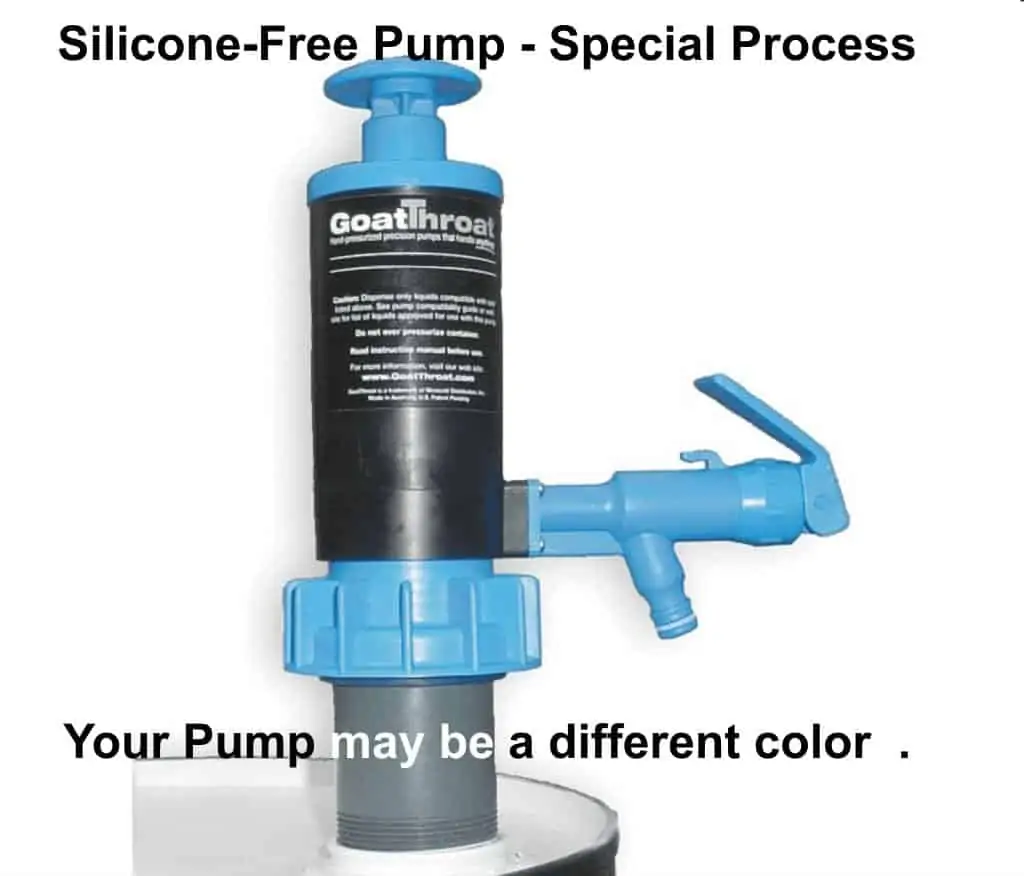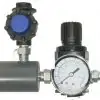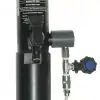GoatThroat Pumps for Chemical Manufacturing
GoatThroat® pumps make ideal chemical handling pumps because they create a safer, easier, and more consistent way to transfer liquids between containers. They can also enable you to store containers in a smarter, more effective manner due to the fact that no tipping is required to activate flow.
Anyone who is tasked with monitoring and optimizing safety conditions at a facility should know about the way GoatThroat pumps can aid in fostering chemical dispensing safety across operations.
As a chemical manufacturer, you are well aware of the requirements for storing, transferring, and applying chemicals. GoatThroat has the hand pumps solutions you need to adequately meet your needs. We can work with nearly any chemical and have experience with over 2000 different chemical materials. Our solutions include:
- Portable chemical transfer pumps
- Chemical dispensing pumps
- Chemical transfer pumps
- Chemical process pumps
GoatThroat’s chemical-resistant pumps are made to be a perfect match for specific material requirements. Our small chemical pumps are excellent for factory use, transfer, and application when automation can’t handle the job. They are sealed systems to protect the handlers from exposure to dangerous fumes, spills, or leaks.
Working with chemicals is a dangerous profession but like every other job, familiarity takes away some workers’ caution. GoatThroat pumps are reliable and consistent in protecting handlers from accidental exposure. Your factory will be able to maintain the same chemical and material safety procedures that are maintained in large processes on a smaller scale with minimal extra training.
If you believe your company is working with chemicals that are not on the compatibility guide, get in contact with one of our experts. We are willing to figure out what your chemical needs to create a solution to fit your specific purposes.
Safe Chemical Storage and Dispensing
Whether you need to keep a chemical safe from outside exposure or outside elements safe from a chemical, GoatThroat Pumps can provide an adequate pump for corrosive liquids or food-grade chemicals. Our chemical pumps make use of a closed system to keep hazardous materials from causing adverse health effects to workers and damage to the facility. Closed systems are also excellent for isolating food-grade materials and maintaining purity.
Among the chemical pumps GoatThroat offers, a popular solution for chemical manufacturers is the SCP line. The durable and high-quality SCP line of GoatThroat pumps meets both National Fire Protection Association (NFPA) 77 and NFPA 30 requirements. Some pumps are manufactured using food-grade materials and are completely safe for food contact.
See more:
- https://www.goatthroat.com/wp-content/uploads/2018/08/GT-NFPA-77-Evaluation-By-Ciba.pdf
- https://www.goatthroat.com/wp-content/uploads/2018/06/Safety-and-Technical_Info_SCP-6500.pdf
GoatThroat has a line of GT pumps that are made specifically to meet Food Grade Standards. These pumps are closed systems made to be wholly safe for food contact. These pumps are perfect for manufacturers producing food materials and compounds. With our food-safe-made pumps, your chemicals can remain isolated from foreign elements. Your chemical product will remain pure and unaffected by possible seal contamination.
See more:
We produce pumps to fit the purposes of every industry that needs to handle chemical materials safely and efficiently. Contact one of our experts to discuss your particular needs. We will craft a solution that will fit your operation.
Chemical Handling Pump Applications
- Transfer chemicals to and from storage to portable containers
- Controlled chemical mixing and dispersion
- Controlled chemical application
- Hazardous cleaning chemical storage and application
- Product testing and ratio experimentation
Dispensing chemicals safely is a primary concern for many chemical warehouses. The fact that GoatThroat pumps do not rely on gravity to release liquid means that there is no worry that workers can become injured by trying to tip and pour a barrel.
These pumps can prevent spills and potentially eliminate the need to clean using heavy cleaning agents. GoatThroat pumps can help promote the overall wellness and safety of employees on a daily basis due to the fact that they don’t require tons of pressure or exertion to dispense liquids, meaning less time is spent having your employees worry about injuries caused by struggling to release liquid from a pump.
While employee safety is foremost, durable and reliable chemical pumps from GoatThroat also allow chemical manufacturers to perform product prototyping on the fly. GoatThroat pumps offer a controlled mixing solution that allows chemical researchers and chemists to quickly adjust ratios during application or dispersion. The speed increase in efficient prototype testing without sacrificing safety is sure to increase research productivity and output.
The safely sealed and closed system that prevents accidental spills and leaks is also more than a health-focused workplace improvement. Accurately dispensed and distributed chemicals cut back on chemical waste. This allows material that previously may have been in a spill to be used in production creating higher product yield and less chemical waste. With a reduced cost in cleaning supplies, cleaning time, chemical waste removal, chemical replacement, employee injury compensation, and increased product yield, your company will see an improvement in revenue and a slight decrease in cost.
Transfer Pumps for Corrosive Liquids
Not all chemicals the world needs are safe to handle. Corrosive materials can erode containers and pumps if they are made of the wrong materials. GoatThroat has put together a comprehensive chemical compatibility guide to find the right product material to match hazardous chemical needs.
As you are well aware, corrosive liquids can cause damage to more than just improper storage materials. Exposure to human skin or orifices can cause permanent and critical damage. This is why every aspect of chemical material handling should be created with function and safety at the forefront. GoatThroat does just that. Our pumps are manufactured with safety and specific purpose as the main focus. Our chemical-resistant pumps are what you need to safely handle corrosive materials manually.
With our portable chemical transfer pumps, your factory workers can apply corrosive liquids and transport them to needed locations with the assurance that GoatThroat pump seals will prevent chemical spills and dangerous material exposure. Our pumps will help you to prevent costly workplace accidents. Keep your employees happy and healthy while saving on operating costs.
The manual nature of GoatThroat pumps allows for creative and safe storage solutions for your large 55-gallon chemical drums. The pumps do not need electric power or to change the orientation of the chemical container. This allows for remote storage of chemical containers. Combined with our portable transfer pumps, chemicals can be stored away from active areas and still be easily accessed for frequent use.
Work with an expert from GoatThroat Pumps to get the right transfer pump materials for your corrosive liquids. We can make the process easy and efficient so you can focus on your company’s primary needs. Let GoatThroat handle providing your chemical hand pump needs.
Download Library.
Click on a title to download.
- Case History - Cleaning & Chemical Manufacturer
- Technical Article - The High Cost of Chemical Exposure
- Technical Article - Chem Info Magazine
Recommended Products
 Silicone Free PumpShop Now
Silicone Free PumpShop Now GoatThroat Groundable Viton PumpShop Now
GoatThroat Groundable Viton PumpShop Now Pneumatic Adapter with RegulatorShop Now
Pneumatic Adapter with RegulatorShop Now SCP Teflon-Kalrez PumpShop Now
SCP Teflon-Kalrez PumpShop Now
Case Studies.
Improving Chemical Process Safety
“When your products’ manufacturing processes involve mixing chemicals, your workers’ safety and EPA compliance are always at the forefront of the business,” said Brad Dagy owner of Ridgway Industries. Dagy’s Pennsylvania based company manufactures cleaners and detergents for both home and industrial use. A few close calls with chemical spills made Dagy realize that a manufacturing process that involved tipping and taping heavy 55-gallon drums of chemicals, leaky spigots and transfer containers meant that injury and chemical disaster were always one slip-of-hand away. Spills threaten worker and environmental safety as much as they did the bottom line in costly liquid inventory waste and lost production time. Taking cues from the EPA’s information on Process Hazard Analysis, Dagy’s safety manager searched the Internet, finding a cost-effective solution from Westcott Industries in their award-winning GT Multi-Pump Dispensing System. The System enabled Ridgway to dispense multiple chemicals at a rate of 4gpm from …
The High Cost of Exposing Workers to Chemicals at Point of Use
Every day industrial workers transfer potentially hazardous chemicals, such as solvents, acetones, lubricants, cleansers, and acids, from large drums into smaller containers, or into machinery. This transfer of chemicals at the point of use, however, can have serious consequences when manual “tip-and-pour” techniques or poorly designed pumps are used. Whether the chemicals are toxic, corrosive, reactive, flammable, emit volatile organic compounds (VOCs), or are even potentially explosive, the danger of accidental contact, even for short periods, can pose a severe hazard to workers. In addition to the potential for injury, there can also be serious financial ramifications for the facility involved. The risks include cost to treat injuries or perform cleanup, as well as workers’ compensation claims, potential liability, OSHA fines, loss of expensive chemicals and even facility/production shutdown. “It can be catastrophic to a company if toxic or highly flammable material is accidentally released at the point of use,” …
Improving Chemical Process Safety
“When your products’ manufacturing processes involve mixing chemicals, your workers’ safety and EPA compliance are always at the forefront of the business,” said Brad Dagy owner of Ridgway Industries. Dagy’s Pennsylvania based company manufactures cleaners and detergents for both home and industrial use. A few close calls with chemical spills made Dagy realize that a manufacturing process that involved tipping and taping heavy 55-gallon drums of chemicals, leaky spigots and transfer containers meant that injury and chemical disaster were always one slip-of-hand away. Spills threaten worker and environmental safety as much as they did the bottom line in costly liquid inventory waste and lost production time.
Taking cues from the EPA’s information on Process Hazard Analysis, Dagy’s safety manager searched the Internet, finding a cost-effective solution from Westcott Industries in their award-winning GT Multi-Pump Dispensing System. The System enabled Ridgway to dispense multiple chemicals at a rate of 4gpm from their individual upright drums, using just a single air line set at 4psi. The system allows fluids to be transferred directly to their point-of-use and dispensed with accuracy from a spring-activated nozzle.
The pumping equipment, made of polypropylene, is one of the most chemically resistant plastics, so they are compatible with Ridgway’s chemical list, as well as more than 1700 chemicals and fluids. The added bonuses, the pumps empty drums to eliminate waste and comply with Resource Conservation and Recovery Act guidelines for disposal. Pumps typically last for years and replacement parts are available.
For Ridgway, GoatThroat Pumps provided a single solution to process safety and productivity. They have been pumping chemicals without incident since 2006.
The High Cost of Exposing Workers to Chemicals at Point of Use
Every day industrial workers transfer potentially hazardous chemicals, such as solvents, acetones, lubricants, cleansers, and acids, from large drums into smaller containers, or into machinery. This transfer of chemicals at the point of use, however, can have serious consequences when manual “tip-and-pour” techniques or poorly designed pumps are used.
Whether the chemicals are toxic, corrosive, reactive, flammable, emit volatile organic compounds (VOCs), or are even potentially explosive, the danger of accidental contact, even for short periods, can pose a severe hazard to workers.
In addition to the potential for injury, there can also be serious financial ramifications for the facility involved. The risks include cost to treat injuries or perform cleanup, as well as workers’ compensation claims, potential liability, OSHA fines, loss of expensive chemicals and even facility/production shutdown.
“It can be catastrophic to a company if toxic or highly flammable material is accidentally released at the point of use,” says Deborah Grubbe, PE, CEng, and founder of Operations and Safety Solutions, a consulting firm specializing in industrial safety. “Companies have to assume that if something can go wrong during chemical transfer, it will, and take appropriate precautions to prevent what could be significant consequences.”
Spiraling Costs of Loss of Containment
Grubbe, who has 40 years of experience working in the chemical, oil and gas industries, including at DuPont, NASA, and for the U.S. military, says “Any time you lose containment, you have an issue that can spiral out of control.”
Corrosive chemicals, for example, can burn skin or flesh. Some chemicals are toxic when touched or inhaled. Cyanotic agents, for instance, can be particularly dangerous or even fatal, since they rob the body of oxygen.
Many chemicals are flammable as well and can be ignited by even the smallest spark from nearby motors or other mechanical equipment. “There is no such thing as a small fire in my business,” says Grubbe.
In addition to cost of cleanup or treating injuries, there are also indirect costs that can be incurred. These include supervisors’ time to document the incident and respond to any added government inspection or scrutiny, as well as the potential for temporary shutdown of the facility.
“The indirect costs can be as much as 2-4 times the direct costs,” says Grubbe. “Not to mention potential liability, workers’ compensation issues, regulatory fines or potential actions from OSHA or the EPA.”
Chemical Transfer Techniques
Traditional practices of transferring liquid chemicals suffer from a number of drawbacks.
Manual techniques, such as the tip-and-pour method, are still common today. Tipping heavy barrels, however, can lead to overpouring or the barrel toppling.
“Some companies choose to transfer of chemicals manually, but it is extremely difficult to control heavy drums,” cautions Grubbe. “I’d recommend against it because of the probability of a spill is so high.”
Although a number of pump types exist for chemical transfer (rotary, siphon, lever-action, piston and electric), most are not engineered as a sealed, contained system. In addition, these pumps can have seals that leak, are known to wear out quickly, and can be difficult to operate, making precise volume control and dispensing difficult.
In contrast, sealed pump systems can dramatically improve the safety and efficiency of chemical transfer.
“A sealed, contained system is ideal when dealing with a toxic, flammable, or corrosive liquid,” says Grubbe. “With sealed devices, like GoatThroat pumps, you can maintain a controlled containment from one vessel to another.”
Small, versatile, hand-operated pressure pumps, such as those manufactured by GoatThroat Pumps, are engineered to work as a sealed system. The pumps can be used for the safe transfer of over 1400 industrial chemicals, including the most aggressive acids, caustics and solvents.
These pumps function essentially like a beer tap. The operator attaches the pump, presses the plunger several times to build up a low amount of internal pressure, and then dispenses the liquid. The tap is configured to provide precise control over the fluid delivery, from slow (1ML/ 1 oz.) up to 4.5 gallons per minute, depending on viscosity.
Because such pumps use very low pressure (<6 PSI) to transfer fluids through the line and contain automatic pressure relief valves, they are safe to use with virtually any container from 2-gallon jugs to 55-gallon drums.
Adoption of Sealed Pump Systems
Although Design Mark Industries keeps its chemicals in a vented, explosion-proof room, the supplier of membrane switches, keypads, and touchscreens sought to further improve the safety and efficiency of transferring acetone and acetate-based chemicals from 55-gallon drums into quart and 5-gallon containers. The chemicals are used in the screen printing process of printed circuitry and graphic overlays.
Production Supervisor Vincent Francisco ruled out manual pouring because of the potential of injury and lack of control in dispensing. Instead, he utilized a variety of traditional pumps including rotary, siphon, and lever-action, but found them all unsatisfactory.
“I was replacing the pumps once or twice a year because they kept breaking down, delivered imprecise amounts, and were not designed as completely self-contained, sealed systems,” says Francisco.
After considerable research online, Francisco decided to utilize a sealed chemical pump system from GoatThroat.
“I consider using [GoatThroat] pumps a ‘best practice’ technique because the barrels remain upright and the entire system is sealed so there is never an issue with exposure or VOCs when transferring chemicals,” says Francisco.
According to Francisco, the sealed pump system is intuitive to use because it operates like a beer tap. “Just pump the plunger a few times, open the spigot and dispense. You have full control over how much is dispensed – even the tiniest amounts – or you can leave it open for a continuous flow. It delivers the precise amount needed.”
Francisco adds that the pumps are built for longevity. Over the past 11 years, he estimates that his company has saved thousands of dollars by eliminating the cost of replacement pumps. “I’ve only replaced one of our three pumps over that time due to constant use, and we could have used it longer,” says Francisco.
Allergy Laboratories Inc., a FDA licensed pharmaceutical manufacturer of biological extracts for the diagnostic testing and therapeutic treatment of allergies, also uses a sealed pump system to transfer acetone from 55 gallon drums to 1 gallon containers for a process to dry out pollen and mold.
According to Charles Cheek, facility manager for Allergy Laboratories, the pharmaceutical chemical delivery process must be very clean and no foreign material can be introduced into the acetone.
Because acetone is highly flammable, he was concerned about using an electric pump that could potentially create a spark. As a result, he decided to purchase a pump that had no electrical or moving parts that could create a hazard.
“We’ve found GoatThroat pumps to be a much safer way to transport chemical liquids,” says Cheek, who utilizes a pneumatic adaptor accessory to supply pressure via in-house compressed air. “There is no spillage, splatter, overpouring, leaking, or VOCs because the system is self-contained. There is no sprayback and we do not get chemicals on our hands. It is a nice, clean delivery system.”
Besides enhancing safety, Cheek says a sealed system can prevent loss of expensive chemicals like acetone. “I haven’t lost any product due to the pumps. They eliminate evaporation, do not leak or drip and I can adjust the flow to get the exact amount I need without spilling or overflow.”
Cheek says he also utilizes pumps to transfer corrosive chemicals used to remove scale from several boilers. Previously, he had to fill a glass beaker with the chemical, climb a ladder and pour the chemicals into the top of the tank.
Now, that work is performed with the help of the pump and 6’ extension hose accessory to efficiently deliver the cleaning chemicals.
“Every time inspectors come in, they say we have the cleanest boiler they have seen,” says Cheek. “With this chemical transfer system, I’m able to transfer exactly what I need to get the job done.”
For more info: call 866-639-4628 toll free; Fax: 212-243-6070; E-mail info@goatthroat.com; or write to Westcott Distribution, Inc. 60 Shell Avenue Milford, CT 06460.

